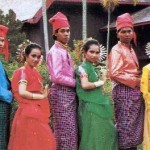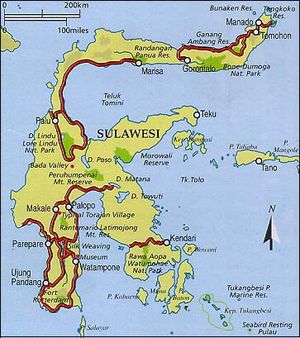Sulawesi is the most uniquely shaped island in the Indonesian archipelago, with four large, narrow peninsulas. Many people describe the island as either crab-shaped or orchid-shaped. Sulawesi is between Borneo and the Maluku Islands, with the Philippines to the north and Java to the south. Sulawesi has six provinces: North Sulawesi, Gorontalo, Central Sulawesi, West Sulawesi, South Sulawesi, and South East Sulawesi. The central part of the island is very mountainous, making the peninsulas remote from each other (Wikipedia).
North Sulawesi is predominately Christian. The largest ethnic group in the province is the Minahasa, who are protestant. This is one of the few areas of Indonesia where there is a church for every 100 meters of road. Off the coast of North Sulawesi is Bunaken, an underwater national park.
Gorontalo is right next to North Sulawesi. It used to be part of North Sulawesi and became a separate province in 2000. The ethnic group by the same name makes up the majority of the people there. They are Muslim, with at least one mosque in every village. Central Sulawesi makes up the western part of the northern peninsula, and extends down to completely cover the central peninsula, making a “C” shape. No one ethnic group has a majority in this province. The Butung, Kalli, Bugis, Tolaki, and Muna are the five largest ethnic groups. (Wikipedia)
West Sulawesi is a small province in the west-central part of Sulawesi. It split off from South Sulawesi in 2004 (Indonesia-tourism.com). The Bugis, Toraja, and Mandar call this province home. South Sulawesi is the southwestern peninsula. Makassar is the capital and is one of Indonesia’s most well-known cities. The Bugis make up over 40% of the population and the Makassar comprise 25% of the population. The remaining 35% is Toraja, Mandar, and other smaller ethnic groups.
South East Sulawesi is the southeastern peninsula of the island, along with some smaller islands right off the peninsula. It is made up of the Buton, Bugis, Tolaki, and Muna people. (Wikipedia)
 The Bugis are the dominant people group in Sulawesi. Two of the most important cultural values for Bugis are siri (personal honor) and siri-pesse (communal honor). A person must defend, maintain, and build his own siri. If a person’s siri is offended, serious forms of revenge will be considered.
The Bugis are the dominant people group in Sulawesi. Two of the most important cultural values for Bugis are siri (personal honor) and siri-pesse (communal honor). A person must defend, maintain, and build his own siri. If a person’s siri is offended, serious forms of revenge will be considered.

Leave a Reply